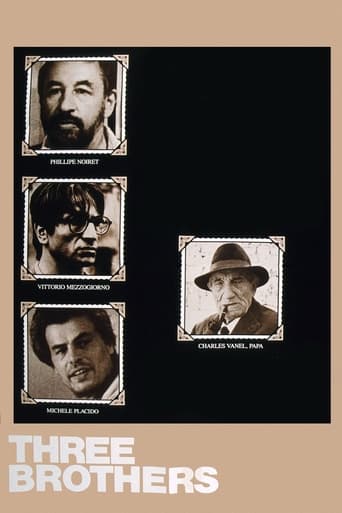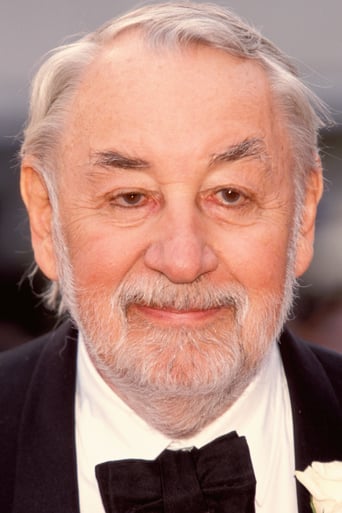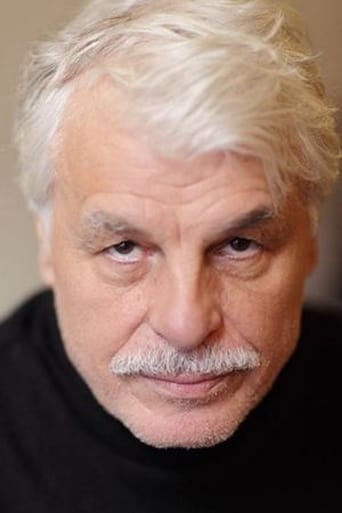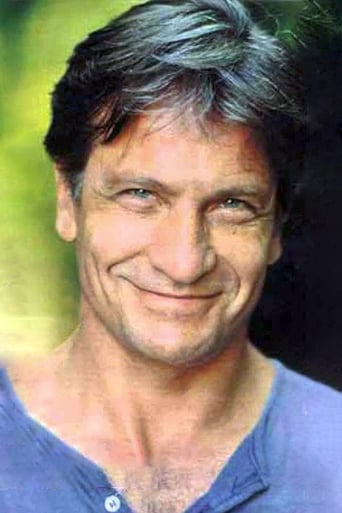Three Brothers (1981)
In a farmhouse in southern Italy, an old woman dies. Her husband summons their sons: from Rome, Raffaele, a judge facing a political case for which he risks assassination; from Naples, the religious and ideological Rocco, a counselor at a correctional institute for boys; from Turin, Nicola, a factory worker involved in labor disputes. Once home, each encounters the past and engages in reveries of what may come.
Watch Trailer
Cast
Similar titles


Reviews
Pretty good movie overall. First half was nothing special but it got better as it went along.
Funny, strange, confrontational and subversive, this is one of the most interesting experiences you'll have at the cinema this year.
What begins as a feel-good-human-interest story turns into a mystery, then a tragedy, and ultimately an outrage.
The tone of this movie is interesting -- the stakes are both dramatic and high, but it's balanced with a lot of fun, tongue and cheek dialogue.
The disturbing opening scene is a nightmare that Rocco Giuranna is having. The rats that are scavenging a trash site seem to herald what he and his two brothers will face as the three come together because the death of their mother. Rocco is a social worker living in a state reformatory where he is in charge of young boys that are in the institution to be re-educated. Unfortunately, they will probably will go to be hard criminals when they are released from the Naples correctional facility.Raffaele, the older brother, is a judge in Rome. He has been asked to preside over an important case coming to trial that involves local terrorists. Italy was living harsh days at the time and judges were the target for paid assassins or revolutionaries with an agenda for eliminating those that dared to speak against them. The upcoming trial has a profound effect on Raffaele's wife, who knows it probably means the death of her husband.The third brother, Nicola, is a factory worker. Like his brothers, he fled the poor South of Italy in search for a better future in Torino. What he finds is unhappiness as he rebels against the firm he feels is enslaving him and his co-workers. His marriage has suffered because his wife has cheated on him and they are separated.It is at this junction that all three brothers are summoned to come home as their mother has died. Donato, the older father, is lost, as he ponders what is going to become of him. His memories of happier times, with the woman he adored, keep flooding back to him as his three sons come home to mourn for their loss. The three brothers, in turn, are haunted by their own memories of their present lives and their youth in the small town in Puglia before they left home.Francesco Rosi, adapted Andrei Platonov's novel "The Third Son", together with Tonino Guerra, one of the best writers in the Italian cinema. Mr. Rosi, a director who shows an affinity for presenting ordinary people in difficult situations in their lives, scored a big success with this film. He knows these characters. The director makes an enormous contribution in the way he deals with the emotions of the principals in this film about the love of the land, on the one hand of Donato, the father, and the restlessness of the three sons that abandoned their birth place in search of a better living. Rosi's triumph is in showing us that ultimately, it's Donato, the father, the one that stayed behind who is the one that lived a better life than their three sons.The director achieves a triumph in the way he directed the four principals in the film. Philippe Noiret, Michele Placido, and Vittorio Mezzogiorno do an excellent job in bringing to life, Raffaele, Nicola and Rocco. It is however Charles Vanel, the veteran French actor who stays with the viewer because of his exquisite portrayal of the older Donato. Mr. Vanel hardly utters a word throughout the movie, yet, his presence is so powerful that at times one tends to forget the others. Mr. Vanel's Donato is one of the best creations in his long film career in France.Pasqualino DiSantis' cinematography captures the essence of what Francesco Rosi was looking for. The director and his photographer were well attuned indeed. Ruggero Mastroianni's film editing shows once more his elegant style of putting the material together. Francesco Rosi is the one that brought all the elements together in this dramatic and satisfactory film.
"Three Brothers" (Italian, 1980): An extremely melancholy movie more like the depression of a Swedish film or the ennui of a French film, than anything typically Italian. Three estranged brothers receive word their Mother has died. Daily lives are put on hold, and each heads to the "country" for the funeral, their Father, and to reacquaint with one another in the village of their childhood. The three are shown in forgiving contrast to their Father, one of the son's daughters, and the old family dog. Think of this movie as a trim, non-commercial, patient, personal, very thoughtful "Big Chill". The scoring was perfectly sad and delicate throughout you will not want to get up and dance. However, unlike a Swedish film, "Three Brothers" does slowly reveal glimmers of acceptance and hope.
This film made during the late seventies studies how a family deals with the death of their martriarch. I found myself relatively bored watching the film but I was impressed with the amount of detail that went into developing the characters. What is most impressive is how the filmmaker concentrates on the differences in generations. That is to say the filmmaker compares and contrasts each caracter with where they were born, when, and how they were brought up.If you are in the mood for a sit back and rest type of film this is not it. But if you want a thinker, you've met your match.
THREE BROTHERS narrows with ease the gulf between two creative approaches in Italian cinema: the drama of social observation and the poetry of lyric force. That any film-maker would be able to look at the problems of a modern industrial society with the sensitivity of a poet or a painter is a wonder in itself. That director Francesco Rosi succeeds so eloquently is doubly wondrous. But then this is the gifted creator of CHRIST STOPPED AT EBOLI and ILLUSTRIOUS CORPSES. The three brothers have returned to their southern home village after the death of their mother. The film begins with the magnified sounds of heartbeats on the soundtrack against the bleak images of a huge building with dark, knocked-out windows. When the credits end we are shown a hideous cluster of rats in close-up. It is the disturbing nightmare we have shared with the middle of three brothers, a worker in a boys' reformatory in Naples. Frustrated by his battle to keep kids off drugs and away from crime, he is the self-giving liberal who is losing the fight. The younger brother is a Turin factory worker, embittered about his working conditions and victim of a failing marriage. The eldest son is a sedate magistrate in a Roman court who is handling a case involving terrorists and who constantly fears for his own life. He also looks upon his radicalized younger brother as a threat, one of the potential terrorists he is struggling against. The Puglia village to which the brothers return is an impoverished place from which they have long escaped and for which each professes a hopeless nostalgic attachment. Much of the movie delves into the varying anxieties of the brothers at a moment of intense introspection. Their aging patriarch father, on the other hand, is a man of great dignity, calm, and simple religious fervor, an emblem of what modern society has lost. He reflects a diminishing and changing past that can never be regained. It is a past that the old man's little granddaughter, with her childlike fascination for the little pleasures of country life, becomes fond of. There is bond between the two that is one of the most touching elements of this film. In a way she is a continuation of her own dead grandmother's attachment to the simple joys of life. The film says that while the sons have gained something in the amenities of urban civilization, they have lost something as well, something vital and profound. They have lost their home, their roots, their traditional values. They lie on children's cots now too small for them. They are overgrown children in cribs, and their uneasy reflections take on the bitterness of regret. They had departed from here for the best of reasons and once gone, as the youngest brother explains, they became immediately homesick. What is in THREE BROTHERS? Very little, if you count. There is a death, a brief return to a hometown, a few memories and flashbacks, some jarring evocations, a child playing, a burial, a beautiful final image. Indeed, nothing much happens. And yet it is as though everything happens. From its poetic tableau-like portrait of life, death, homesickness, there emerges a tapestry of modern society, perhaps even modern man in general, that is as violently graphic as it is lovingly gentle. It is a work of art.













